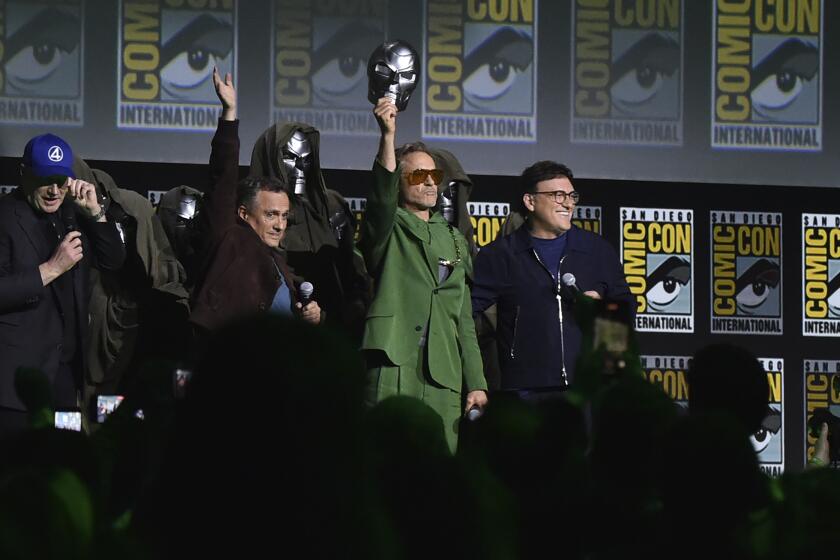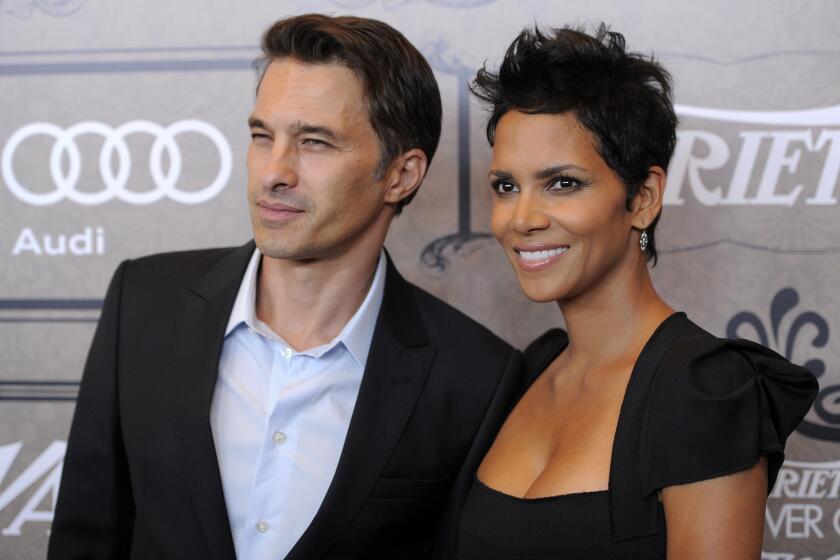Perils of capitalism
“SYRIANA” is a film of paradoxes, contradictions and complications. It’s a political thriller that thrives on misdirection, on hiding information just as it hides glamorous George Clooney behind a rumpled exterior and a full beard. Even its title is a puzzler: The meaning is critical, but no one on screen so much as says the word let alone explains it.
Written and directed by Stephen Gaghan, “Syriana” is a fearless and ambitious piece of work, made with equal parts passion and calculation, an unapologetically entertaining major studio release with compelling real-world relevance, a film that takes numerous risks and thrives on them all. An Oscar winner for writing “Traffic,” Gaghan is not shy about using traditional Hollywood ingredients such as dramatically supercharged plot elements and a major-player cast (including Matt Damon, Jeffrey Wright, Chris Cooper and Amanda Peet), but what he does with them is the opposite of standard.
Gaghan fiddles with the norms of studio storytelling in ways both nervy and unnerving, including treating all his stars like supporting players, the better to grapple with one of today’s biggest stories, the ramifications of the fight to control the planet’s dwindling supply of oil.
More than that, Gaghan uses the cover of genre picture-making to present a scathing critique of how America acts to protect its interests, how we try to get the world to dance to our tune, and what the consequences of those actions can be. This is a film to make your head spin and, more critically, your mind ponder.
This is also a film, frankly, that can be as confusing as it is involving, that intentionally tells its story in a way that is all but impossible to follow in detail. That’s due to both the complexity of the tale “Syriana” has chosen and Gaghan’s subversive determination to use mystification in the service of what he sees as a greater good. Pursing his widely quoted notion that oil was the world’s crack addiction, Gaghan made a connection with former top CIA field officer Robert Baer, whose book “See No Evil” gets a “suggested by” credit. Gaghan hung out with Baer for a considerable period of time, meeting major players in the interconnected worlds of espionage and politics, international finance and law, oil and radical Islam.
(As to the film’s title, Gaghan says that while “Syriana” is “a very real term used by Washington think tanks to describe a hypothetical reshaping of the Middle East,” its use here is more generic, pointing to “the fallacious dream that you can successfully remake nation-states in your own image.”)
Out of all of this came “Syriana’s” complicated plot, which revolves around a fictional but oil-rich emirate in the Persian Gulf, which begins the narrative by announcing it has transferred drilling rights from Connex, a giant Texas firm, to the higher-bidding People’s Republic of China. This change profoundly affects four people, individuals who are not initially aware of one another but are all involved in the geopolitical world of Middle Eastern oil and gas.
As Connex tries to recover from its loss, it decides to merge with a smaller firm called Killen. Owned by Jimmy Pope (Chris Cooper), Killen has acquired the drilling rights to a rich field in Kazakhstan. One of “Syriana’s” key players is Bennett Holiday (Jeffrey Wright), a smooth, controlled Washington lawyer charged by his power-broker boss, Dean Whiting (Christopher Plummer), to do whatever it takes to ensure that the Department of Justice approves the merger.
Two of “Syriana’s” other major figures are also in the oil business, albeit at opposite ends of the spectrum. Bryan Woodman (Matt Damon) is an energy analyst who lives with his wife, Julie (Amanda Peet) and their two sons in posh Geneva. Wasim Kahn (Mazhar Munir) is an impoverished Pakistani oil field worker employed by Connex in that mythical emirate who loses his job when the firm loses those drilling rights to the Chinese. “Syriana’s” last major player is veteran CIA field operative Bob Barnes (Clooney), a been-around intelligence agent who speaks Arabic and Farsi and has never hesitated to get his hands dirty in unsavory covert operations. Now nearing the end of his career, Barnes gets drawn into what is happening in the emirate in a way that eventually affects not only his life but also the lives of all the film’s major players.
What makes “Syriana” unusual, however, is not so much its plot complexities, which that summary barely hints at, but the way Gaghan and his team have taken daring pains to keep us in the dark by a strategy of obfuscation and willful withholding of information. For “Syriana” is a film that chooses consistently to place the audience one step behind the action, to in effect eliminate the kind of information-providing exposition that we can ordinarily count on. Aided by impressive editing by Tim Squyres (“Gosford Park,” “Crouching Tiger, Hidden Dragon”), we are dropped into the middle of situations, entering rooms after the events have begun, hearing conversations that have started. More important, most of the film’s characters are introduced cold, without any identifying information, any hint as to who is important, who is peripheral. It’s up to us to use our wits to figure out what’s what, and, by “Syriana’s” end, the film has shown enough to enable us to do that.
The reason “Syriana” places complete understanding barely beyond our grasp is twofold. First of all, just as placing a mechanical rabbit a fraction out of the reach of greyhounds focuses the animals’ attention, this technique ensures that human audiences concentrate intensely on the information at hand. Gaghan, a natural storyteller, helps this process along by building in unashamedly emotional moments, often situations between fathers and sons, that provide dramatic handholds on an otherwise slick surface.
The other reason “Syriana” is structured the way it is is as an aid to verisimilitude. To be heedlessly thrown into things heightens the film’s sense of reality, giving us the feeling that we are on the inside, deliciously eavesdropping on behind-closed-doors situations.
“Syriana” encourages that insider feeling in other ways, including having sizable chunks of dialogue in subtitled Arabic (which Clooney had to learn). Elegantly photographed with hand-held cameras by the veteran Robert Elswit (who most recently did Clooney’s “Good Night, and Good Luck”), the production shot in several locations (including Washington, D.C., Texas, Geneva, Dubai and Morocco, which doubled for Tehran, Beirut and the emirate) to give the film a strong visual sense of place.
This overarching focus on enhancing reality is in the service of making us believe that what we’re seeing on screen in “Syriana” just might be happening at this very moment, that a shadowy, amoral cabal of untouchable Washington power brokers might be pulling the strings that control the world.
This is conspiracy-theory filmmaking of the most bravura kind, but if only a fraction of its suppositions are true, we -- and the world -- are in a world of trouble.
*
‘Syriana’
MPAA rating: R for violence and language
Times guidelines: Adult subject matter
Released by Warner Bros. Pictures. Director Stephen Gaghan. Producers Jennifer Fox, Michael Nozik, Georgia Kacandes. Executive producers George Clooney, Steven Soderbergh, Ben Cosgrove, Jeff Skoll. Screenplay Stephen Gaghan, suggested by the book “See No Evil” by Robert Baer. Cinematographer Robert Elswit. Editor Tim Squyres. Costumes Louise Frogley. Music Alexandre Desplat. Production design Dan Weil. Art directors Alan Hook, Laurent Ott. Set decorators Olivia Bloch-Laine, Jan Pascale. Running time: 2 hours, 3 minutes.
In general release.
More to Read
Only good movies
Get the Indie Focus newsletter, Mark Olsen's weekly guide to the world of cinema.
You may occasionally receive promotional content from the Los Angeles Times.











